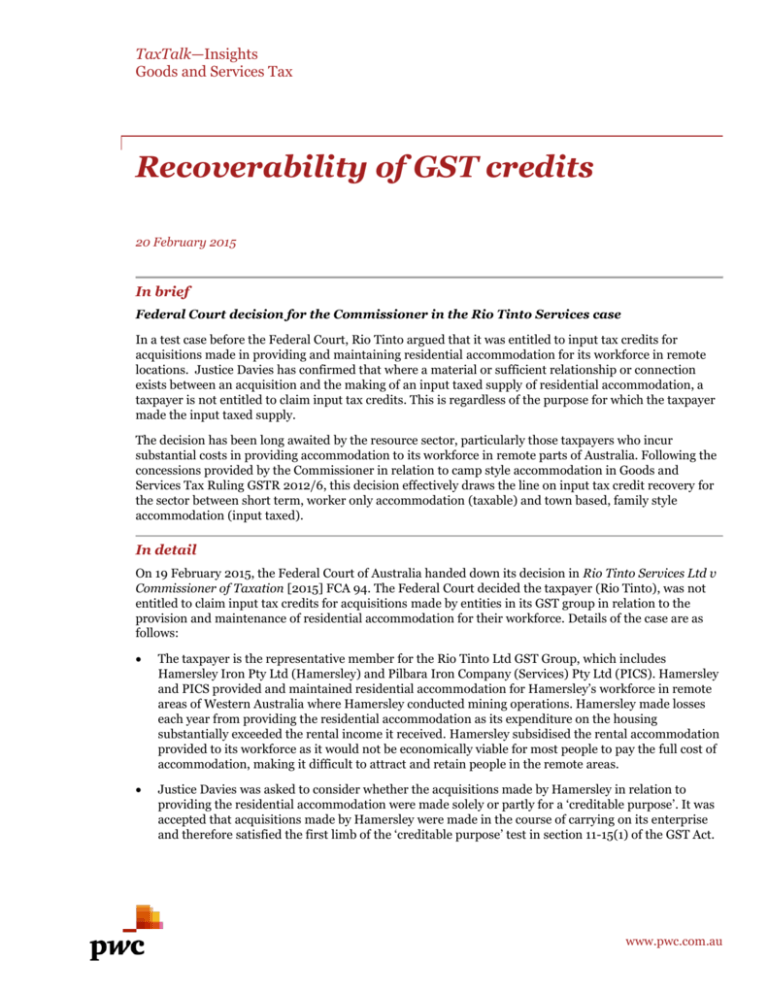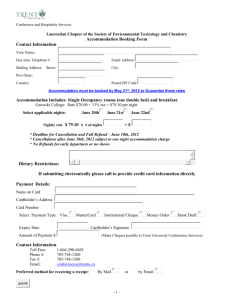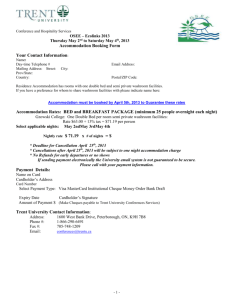
TaxTalk—Insights
Goods and Services Tax
Recoverability of GST credits
20 February 2015
In brief
Federal Court decision for the Commissioner in the Rio Tinto Services case
In a test case before the Federal Court, Rio Tinto argued that it was entitled to input tax credits for
acquisitions made in providing and maintaining residential accommodation for its workforce in remote
locations. Justice Davies has confirmed that where a material or sufficient relationship or connection
exists between an acquisition and the making of an input taxed supply of residential accommodation, a
taxpayer is not entitled to claim input tax credits. This is regardless of the purpose for which the taxpayer
made the input taxed supply.
The decision has been long awaited by the resource sector, particularly those taxpayers who incur
substantial costs in providing accommodation to its workforce in remote parts of Australia. Following the
concessions provided by the Commissioner in relation to camp style accommodation in Goods and
Services Tax Ruling GSTR 2012/6, this decision effectively draws the line on input tax credit recovery for
the sector between short term, worker only accommodation (taxable) and town based, family style
accommodation (input taxed).
In detail
On 19 February 2015, the Federal Court of Australia handed down its decision in Rio Tinto Services Ltd v
Commissioner of Taxation [2015] FCA 94. The Federal Court decided the taxpayer (Rio Tinto), was not
entitled to claim input tax credits for acquisitions made by entities in its GST group in relation to the
provision and maintenance of residential accommodation for their workforce. Details of the case are as
follows:
The taxpayer is the representative member for the Rio Tinto Ltd GST Group, which includes
Hamersley Iron Pty Ltd (Hamersley) and Pilbara Iron Company (Services) Pty Ltd (PICS). Hamersley
and PICS provided and maintained residential accommodation for Hamersley’s workforce in remote
areas of Western Australia where Hamersley conducted mining operations. Hamersley made losses
each year from providing the residential accommodation as its expenditure on the housing
substantially exceeded the rental income it received. Hamersley subsidised the rental accommodation
provided to its workforce as it would not be economically viable for most people to pay the full cost of
accommodation, making it difficult to attract and retain people in the remote areas.
Justice Davies was asked to consider whether the acquisitions made by Hamersley in relation to
providing the residential accommodation were made solely or partly for a ‘creditable purpose’. It was
accepted that acquisitions made by Hamersley were made in the course of carrying on its enterprise
and therefore satisfied the first limb of the ‘creditable purpose’ test in section 11-15(1) of the GST Act.
www.pwc.com.au
In relation to the second limb of the ‘creditable purpose’ test in section 11-15(2)(a) (i.e. that you do not
acquire the thing for a creditable purpose to the extent that the acquisition relates to making supplies
that would be input taxed), the taxpayer accepted that the provision of the accommodation is an input
taxed supply and accepted there is a connection between the acquisitions in question and the
provision of the accommodation.
However, the taxpayer contended that for section 11-15(2)(a) to apply, the making of an input taxed
supply, not the making of a taxable supply, must be the ‘moving cause’ or ‘purpose’ of the acquisition.
It was submitted the acquisitions in question did not relevantly ‘relate to’ the making of supplies that
would be input taxed because the ‘moving cause’ in, or ‘purpose’ of, supplying residential
accommodation was the carrying on of Hamersley’s ‘enterprise’ of mining and selling iron ore (i.e.
making taxable or GST free supplies) not the leasing of accommodation as an end activity in itself (i.e.
making input taxed supplies).
Justice Davies did not agree with the taxpayers submissions and found that section 11-15(2)(a) simply
denotes that there must be a relationship or connection between an acquisition and the making of
input taxed supplies. The existence of such a relationship is not made to depend on a ‘purpose’ test. A
finding that the provision of accommodation was an essential and necessary incident of Hamersley
carrying on its mining operations would not mean that section 11-15(2)(a) is not engaged. The Court
held that as the acquisitions in question had a direct and immediate connection with Hamersley’s
provision of lease accommodation, section 11-15(2)(a) applied to deny the taxpayer input tax credits.
The takeaway
The decision of the Federal Court essentially confirms that taxpayers are not entitled to claim input tax
credits to the extent any acquisitions made relate to an input taxed supply. This is regardless of whether
the making of the input taxed supply is the main purpose of the entity’s enterprise or is merely incidental
to its main activities. The decision may be subject to appeal by the Applicant.
If you make input taxed supplies, including financial supplies, you should carefully reconsider what
acquisitions relate partially or wholly to those supplies and deny any GST incurred on those acquisitions
as necessary.
Let’s talk
For a deeper discussion of how these issues might affect your business, please contact:
Peter Konidaris,
National Indirect Taxes leader
+61 (3) 8603 1168
peter.konidaris@au.pwc.com
Matthew Strauch, Melbourne
+61 (3) 8603 6952
matthew.strauch@au.pwc.com
Michelle Tremain, Perth
+61 (8) 9238 3403
michelle.tremain@au.pwc.com
Ross Thorpe, Perth
+61 (8) 9238 3117
ross.thorpe@au.pwc.com
Adrian Abbott, Sydney
+61 (2) 8266 5140
adrian.abbott@au.pwc.com
© 2015 PricewaterhouseCoopers. All rights reserved. In this document, “PwC” refers to PricewaterhouseCoopers a partnership
formed in Australia, which is a member firm of PricewaterhouseCoopers International Limited, each member firm of which is a
separate legal entity. This publication is a general summary. It is not legal or tax advice. Readers should not act on the basis of this
publication before obtaining professional advice. PricewaterhouseCoopers is not licensed to provide financial product advice under
the Corporations Act 2001 Cth). Taxation is only one of the matters that you need to consider when making a decision on a financial
product. You should consider taking advice from the holder of an Australian Financial Services License before making a decision on
a financial product.
Liability limited by a scheme approved under Professional Standards Legislation.
PwC
Page 2






